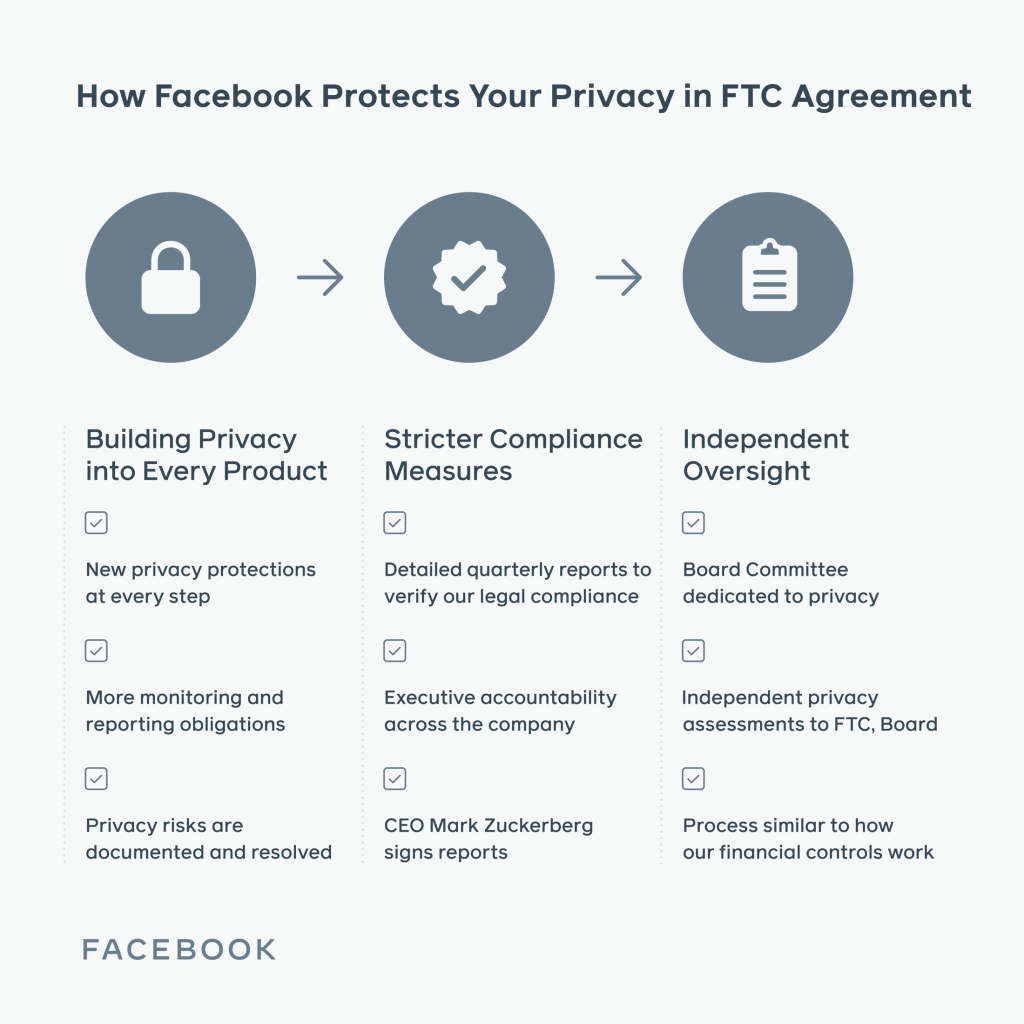SOCIAL
Federal Court Approves Facebook’s $5 Billion Privacy Agreement with the FTC Over Cambridge Analytica

Facebook is looking to move on from the Cambridge Analytica scandal, with the Federal Court this week approving its agreement with the FTC, that it made last July, which will see the company pay a $5 billion fine and implement strict new data privacy measures.
As explained by Facebook’s Chief Privacy Officer Michael Protti:
“On Thursday, a federal court officially approved the agreement we reached with the Federal Trade Commission (FTC) last July. This concludes the FTC’s investigation that began after the events surrounding Cambridge Analytica in 2018. […] With this agreement now in place, executive leaders at the company, including our CEO, will now certify our compliance with it quarterly and annually to the FTC. We are also creating a new Privacy Committee on our Board of Directors that will be comprised solely of independent directors, and we’ll work with a third-party, independent assessor who will regularly and directly report to the Privacy Committee on our privacy program compliance.”
As noted, the agreement was first announced last July, along with a record fine for breaches stemming from the way Cambridge Analytica accessed and utilized Facebook audience data for targeted political campaigning.
The FTC reiterated the significance of the fine at the time:
“The $5 billion penalty against Facebook is the largest ever imposed on any company for violating consumers’ privacy and almost 20 times greater than the largest privacy or data security penalty ever imposed worldwide. It is one of the largest penalties ever assessed by the U.S. government for any violation.”
After a long investigation into its processes, Facebook agreed that it had failed in its duty to protect user data, and has since committed to improving its systems in line with the FTC agreement.
Those improvements, thus far, have included:
The agreement will now go into full effect, with Facebook being held to these rulings on various fronts, including additional reporting and transparency requirements, along with the appointment of its Privacy Committee.

Facebook has already been working towards the implementation of this strategy already, with the Federal Court’s approval really more of a formality in this respect.
As noted by Protti:
“This agreement has been a catalyst for changing the culture of our company. We’ve changed the process by which we onboard every new employee at Facebook to make sure they think about their role through a privacy lens, design with privacy in mind from the beginning and work proactively to identify potential privacy risks so that mitigations can be implemented.”
Indeed, Facebook has made its data collection processes more transparent, and has provided simplified privacy tools to help people control what data Facebook and partner businesses are able to access. Facebook has also significantly limited access to its API, restricting third-party connection to its graph, including for academic organizations, which is how Cambridge Analytica first gained access to its information.
Definitely, Facebook has improved its systems, but at the same time, it is also worth noting that Facebook is still taking in a lot of data. Facebook is still gathering info on your every action – on Facebook, on Instagram, in WhatsApp and Messenger. And Facebook does still use that information to fuel its all-powerful ad targeting. And there will, at some point, be another significant controversy around Facebook’s data usage practices, because data is where Facebook wins, where it beats out everyone else, and what enables it to provide some of the best ad targeting options available.
But next time, Facebook will be able to point to its agreements, and show regulators that its users actually agreed to this. Which is where much of the regulatory and enforcement action is limited. Yes, you can force Facebook to make its users more aware of how their data is being used. But if the users themselves choose to accept those processes, and agree to Facebook’s data usage policies, then they’re largely on their own.
And most people do accept such. No one reads the fine print, and people sign up to social platforms because their friends are on them. So what if Facebook uses some of your data for targeted ads? It’s no problem, right?
The scope of potential data usage is difficult to outline in this respect. In isolation, it doesn’t mean a lot, but when you’re dealing with data collected from 2.5 billion people, that data set can provide significant insight.
Letting it get into the wrong hands is something that Facebook is now increasingly wary of, but Facebook still has it, and its old data sets are still out there. Others can also still utilize Facebook’s systems to target ads in a wide range of ways.
Nevertheless, in a legal sense, Facebook is now closing the book on the Cambridge Analytica debacle.
You can read more about Facebook’s final agreement here.
SOCIAL
Snapchat Explores New Messaging Retention Feature: A Game-Changer or Risky Move?

In a recent announcement, Snapchat revealed a groundbreaking update that challenges its traditional design ethos. The platform is experimenting with an option that allows users to defy the 24-hour auto-delete rule, a feature synonymous with Snapchat’s ephemeral messaging model.
The proposed change aims to introduce a “Never delete” option in messaging retention settings, aligning Snapchat more closely with conventional messaging apps. While this move may blur Snapchat’s distinctive selling point, Snap appears convinced of its necessity.
According to Snap, the decision stems from user feedback and a commitment to innovation based on user needs. The company aims to provide greater flexibility and control over conversations, catering to the preferences of its community.
Currently undergoing trials in select markets, the new feature empowers users to adjust retention settings on a conversation-by-conversation basis. Flexibility remains paramount, with participants able to modify settings within chats and receive in-chat notifications to ensure transparency.
Snapchat underscores that the default auto-delete feature will persist, reinforcing its design philosophy centered on ephemerality. However, with the app gaining traction as a primary messaging platform, the option offers users a means to preserve longer chat histories.
The update marks a pivotal moment for Snapchat, renowned for its disappearing message premise, especially popular among younger demographics. Retaining this focus has been pivotal to Snapchat’s identity, but the shift suggests a broader strategy aimed at diversifying its user base.
This strategy may appeal particularly to older demographics, potentially extending Snapchat’s relevance as users age. By emulating features of conventional messaging platforms, Snapchat seeks to enhance its appeal and broaden its reach.
Yet, the introduction of message retention poses questions about Snapchat’s uniqueness. While addressing user demands, the risk of diluting Snapchat’s distinctiveness looms large.
As Snapchat ventures into uncharted territory, the outcome of this experiment remains uncertain. Will message retention propel Snapchat to new heights, or will it compromise the platform’s uniqueness?
Only time will tell.
SOCIAL
Catering to specific audience boosts your business, says accountant turned coach

While it is tempting to try to appeal to a broad audience, the founder of alcohol-free coaching service Just the Tonic, Sandra Parker, believes the best thing you can do for your business is focus on your niche. Here’s how she did just that.
When running a business, reaching out to as many clients as possible can be tempting. But it also risks making your marketing “too generic,” warns Sandra Parker, the founder of Just The Tonic Coaching.
“From the very start of my business, I knew exactly who I could help and who I couldn’t,” Parker told My Biggest Lessons.
Parker struggled with alcohol dependence as a young professional. Today, her business targets high-achieving individuals who face challenges similar to those she had early in her career.
“I understand their frustrations, I understand their fears, and I understand their coping mechanisms and the stories they’re telling themselves,” Parker said. “Because of that, I’m able to market very effectively, to speak in a language that they understand, and am able to reach them.”Â
“I believe that it’s really important that you know exactly who your customer or your client is, and you target them, and you resist the temptation to make your marketing too generic to try and reach everyone,” she explained.
“If you speak specifically to your target clients, you will reach them, and I believe that’s the way that you’re going to be more successful.
Watch the video for more of Sandra Parker’s biggest lessons.
SOCIAL
Instagram Tests Live-Stream Games to Enhance Engagement

Instagram’s testing out some new options to help spice up your live-streams in the app, with some live broadcasters now able to select a game that they can play with viewers in-stream.
As you can see in these example screens, posted by Ahmed Ghanem, some creators now have the option to play either “This or That”, a question and answer prompt that you can share with your viewers, or “Trivia”, to generate more engagement within your IG live-streams.
That could be a simple way to spark more conversation and interaction, which could then lead into further engagement opportunities from your live audience.
Meta’s been exploring more ways to make live-streaming a bigger consideration for IG creators, with a view to live-streams potentially catching on with more users.
That includes the gradual expansion of its “Stars” live-stream donation program, giving more creators in more regions a means to accept donations from live-stream viewers, while back in December, Instagram also added some new options to make it easier to go live using third-party tools via desktop PCs.
Live streaming has been a major shift in China, where shopping live-streams, in particular, have led to massive opportunities for streaming platforms. They haven’t caught on in the same way in Western regions, but as TikTok and YouTube look to push live-stream adoption, there is still a chance that they will become a much bigger element in future.
Which is why IG is also trying to stay in touch, and add more ways for its creators to engage via streams. Live-stream games is another element within this, which could make this a better community-building, and potentially sales-driving option.
We’ve asked Instagram for more information on this test, and we’ll update this post if/when we hear back.
-

 SEARCHENGINES6 days ago
SEARCHENGINES6 days agoGoogle Core Update Volatility, Helpful Content Update Gone, Dangerous Google Search Results & Google Ads Confusion
-

 SEO6 days ago
SEO6 days ago10 Paid Search & PPC Planning Best Practices
-

 MARKETING5 days ago
MARKETING5 days ago5 Psychological Tactics to Write Better Emails
-

 MARKETING7 days ago
MARKETING7 days ago2 Ways to Take Back the Power in Your Business: Part 2
-

 SEARCHENGINES5 days ago
SEARCHENGINES5 days agoWeekend Google Core Ranking Volatility
-

 SEO6 days ago
SEO6 days agoWordPress Releases A Performance Plugin For “Near-Instant Load Times”
-

 MARKETING6 days ago
MARKETING6 days agoThe power of program management in martech
-
SEARCHENGINES4 days ago
Daily Search Forum Recap: April 15, 2024


